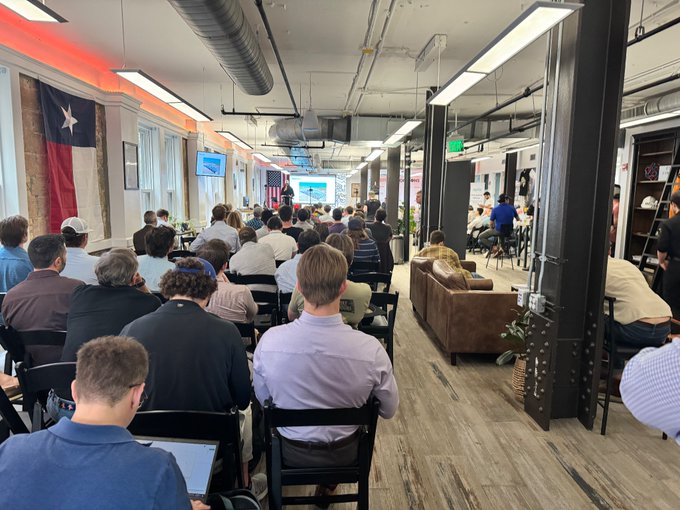

Austin, Texas, stands out as the bitcoin capital of the United States, attracting a diverse community of bitcoin enthusiasts and experts.
Austin, Texas, has garnered a reputation as the bitcoin capital of the United States, attracting bitcoin enthusiasts and professionals regardless of market conditions, as reported in a recent CNBC segment by MacKenzie Sigalos. This attraction is attributed to a confluence of factors including favorable Bitcoin policies, abundant energy, and a concentration of skilled developers and miners. Since the inception of Bitcoin in 2009, following the financial crisis, Austin has become an increasingly logical hub for the Bitcoin community, particularly as the city was already on its way to becoming a technological epicenter.
The Bitcoin Commons serves as a central hub for the burgeoning Bitcoin community in Austin. Located on Congress Avenue, a prominent street that leads to the Texas State Capitol, the Bitcoin Commons provides a collaborative space for startups and early-stage companies that may not have the resources for their own office space.
The venue also hosts Bitdevs, a monthly meetup where participants engage in deep technical discussions about Bitcoin's codebase and express concerns regarding dependencies such as GitHub, which is integral to the development process but also seen as a potential threat to the Bitcoin network's autonomy.
Amid the influx of visitors during the South by Southwest festival, the Bitcoin Commons organizes additional events, including a "Bitcoin takeover," to provide a dedicated track for bitcoin discussions and networking. Furthermore, Austin's bitcoin programming extends to major hackathons, which foster innovation and collaboration within the community.

Francisco Chavarria, who moved to Austin to join this community of like-minded individuals, led his company Yopaki to win first place at a recent hackathon. Yopaki is a neo-bank focusing on the Latin American market, exemplifying the entrepreneurial spirit and collaborative ethos prevalent in Austin's Bitcoin scene.
The winning team at the Top Builder finals, Pleb Lab, Austin TX. Hosted at Bitcoin Commons.@yopakibitcoin, a Mexican Bitcoin Neobank 🔥 What a great product!
— Access Tribe (@AccessTribe) March 22, 2024
📽️ Watch the full session here: https://t.co/H45oRJEkFL#PlebLab #BitcoinCommons #WolfNY #TopBuilder2024 pic.twitter.com/FejnytJ68A
Grant Gilliam, a former private equity professional from New York, now runs a venture capital fund called Ten31 that is focused on Bitcoin. With $125 million in equity investment over the last five years and a keen interest in the infrastructure of the Bitcoin ecosystem, the fund is strategically placing bets across various sectors related to Bitcoin, such as financial services and lightning network solutions.
Gilliam, a regular at the Bitdevs meetup, shares insights on investment trends, highlighting skepticism towards certain layer two (L2) Bitcoin investments, while remaining generally bullish on the deal space. He suggests that while some L2 projects may be overhyped, the fundamental building blocks of the Bitcoin ecosystem continue to present valuable investment opportunities.
Mining is a significant aspect of the Bitcoin narrative in Texas. With the periodic halving event that reduces Bitcoin issuance, miners like James McAvity prepare by optimizing their operations. McAvity's 16-megawatt mine in West Texas, largely powered by renewable energy, reflects an industry preparing for the halving's impact on market dynamics.
"Texas is #1 in #bitcoin mining efficiency and this is not an accident. Texas is a free market haven and we let our power grid work. Bitcoin mining is an economically perfect consumer of electricity." - @jamesmcavity pic.twitter.com/dwDsAudYQt
— Unchained (@unchainedcom) March 15, 2024
McAvity, formerly a trader in New York, notes that the inflow of funds into Bitcoin Exchange-Traded Funds (ETFs) has altered market pricing dynamics, suggesting that the halving's impact on supply might be less significant compared to these capital inflows.
As the Bitcoin community in Austin continues to mature, the discourse around the Bitcoin's value also evolves. While the price is acknowledged as an important indicator, it is understood to be the result of numerous factors, including the collective effort of individuals who contribute to enhancing Bitcoin's security and utility.
In conclusion, the Bitcoin ecosystem in Austin is characterized by a strong sense of community, collaboration, and a shared vision of building a robust infrastructure for Bitcoin. The city's blend of policy support, energy resources, and talent continues to solidify its standing as a leading center for Bitcoin innovation.
